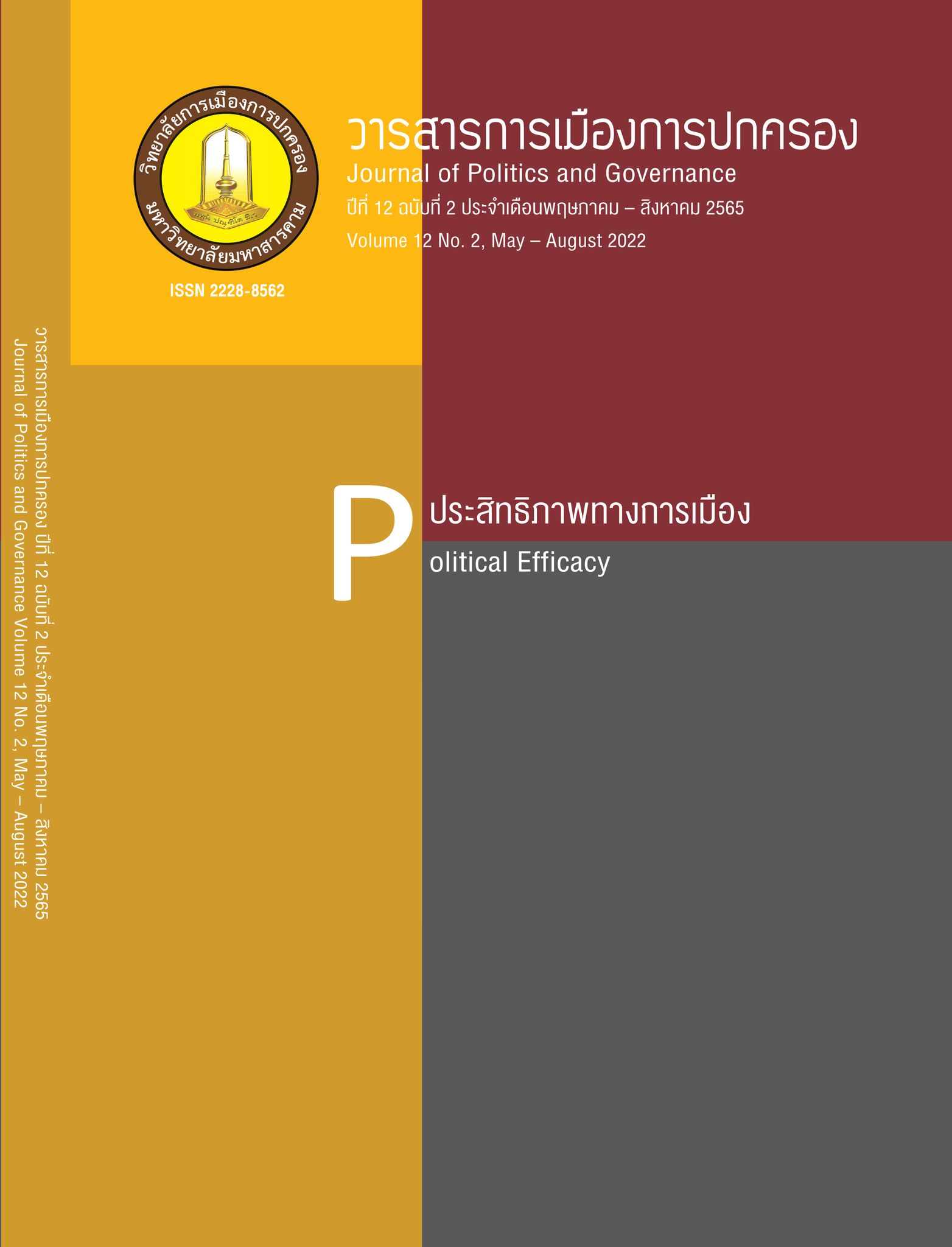Election Behavior B.E. 2562 of People in Surat Thani Province
Main Article Content
Abstract
This article presents a study of electoral behaviors in the 2019 Thailand general election in Surat Thani province. The objectives were (1) to study of political climate in the 2019 Thailand general election in Surat Thani province; (2) to study of political movements and political behavior of candidates; (3) to study roles of state departments and other organizations in the election; (4) to study changes of people’s political behaviors; (5) to study the use of election campaign resources; (6) to study candidates who have switched political parties and factors that affected people’s decision-making. This study was qualitative research using methods of documentary study, participant and non-participant observation, in-depth interview by accidental sampling from six election zones. The research revealed the following (1) There are many candidates because election was not held for a long time and the impact of mixed member apportionment election system, however, the contest among candidates was not severe. (2) Election campaign methods were not different from previous elections except more use of social media and candidates from different parties did not disparage or blame each other. (3) State officers were neutral and collaborated with other organizations properly. (4) Political behavior of people in Surat Thani Province have not been changed from previous elections, and voters continued to admire the Democratic Party. (5) People have a negative attitude toward candidates who used financial fraud, however, some non-monetary incentives for election fraud were found. (6) People think that candidates who have switched political parties and those who are part of political dynasties are acceptable because their new party makes more choices for people, however, the factor that most affected people’s decision-making is political party. The study suggested that public agencies should make people more understand about new election system and use more information technology in election management.
Article Details
References
ชวน เพชรแก้ว และคณะ. (2558). การศึกษาความเคลื่อนไหวทางการเมืองและพฤติกรรมการเลือกตั้งสมาชิกสภาผู้แทนราษฎร พ.ศ. 2554: จังหวัดสุราษฎร์ธานี. กรุงเทพฯ: สำนักวิจัยและพัฒนา, สถาบันพระปกเกล้า.
รัชกรณ์ นภาพรพิพัฒน์. (2534). แบบแผนการลงคะแนนเสียงชาวไทยเชื้อสายจีนในเขตชุมชนหนาแน่น เขต 2 กรุงเทพมหานคร. (วิทยานิพนธ์ปริญญามหาบัณฑิต). จุฬาลงกรณ์มหาวิทยาลัย, คณะรัฐศาสตร์, สาขาวิชาการปกครอง. กรุงเทพฯ.
รุจน์จาลักษณ์รายา คณานุรักษ์. (2553). นักการเมืองถิ่นจังหวัดสุราษฎร์ธานี. กรุงเทพฯ: สถาบันพระปกเกล้า.
Held, David. (1995). Democracy and the Global Order: from the modern state to cosmopolitan governance. Cambridge: Polity Press.
Downs, Anthony. (1957). An Economic Theory of Democracy. New York: Harperr & Row.
Neimi, Richard G. & Weisberg, Herbert F. (1984). Controversies in American Voting Behavior. Washing D.C.: A Division of Congressional Quarterly Inc.
บทสัมภาษณ์
ประเวศ ไทยประยูร. (2562, 4 มิถุนายน). รองผู้ว่าราชการจังหวัดสุราษฎร์ธานี ศูนย์ราชการจังหวัดสุราษฎร์ธานี. [บทสัมภาษณ์].
ผู้มีสิทธิเลือกตั้งในเขตเลือกตั้งที่ 1. (2562, 15 มกราคม). หมู่บ้านภูเก็ตการเคหะ, สุราษฎร์ธานี, แบบเครื่องมือวิจัยก่อนการเลือกตั้ง. [บทสัมภาษณ์].
ผู้มีสิทธิเลือกตั้งในเขตเลือกตั้งที่ 1-6. (2562. มกราคม-กุมภาพันธ์). เขตเลือกตั้งที่ 1-6, สุราษฎร์ธานี, แบบเครื่องมือวิจัยก่อนการเลือกตั้ง. [บทสัมภาษณ์].
ศรัณยู อาทิตยศรัญยากร. (2562, 4 มิถุนายน). ผู้อำนวยการคณะกรรมการการเลือกตั้งประจำจังหวัดสุราษฎร์ธานี สำนักงานคณะกรรมการการเลือกตั้งประจำจังหวัดสุราษฎร์ธานี. [บทสัมภาษณ์].


